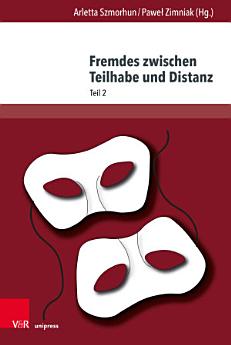Fremdes zwischen Teilhabe und Distanz: Fluktuationen von (Nicht-)Zugehörigkeiten in Sprache, Literatur und Kultur, Teil 2
Arletta Szmorhun · Paweł Zimniak
září 2021 · V&R Unipress
E‑kniha
395
Stránky
family_home
Vhodná
info
reportHodnocení a recenze nejsou ověřeny Další informace
Podrobnosti o e‑knize
Fremdheit, Eigenheit und Vertrautheit haben einen relationalen Charakter und können einander stören, herausfordern, befruchten und ineinander übergehen, was nicht zuletzt mit dem prozessualen Charakter von Kultur(en) im Zusammenhang steht. Die Verfügungsgewalt über den Raum schließt immer die Frage ein, mit welcher Intensität Fremdes in den Erfahrungsbereich des Einzelnen, einer Gemeinschaft oder Gesellschaft eintreten darf, wie sich seine Positionierung sowie seine Ausweitungs- und Ausdrucksmöglichkeiten gestalten. Am Beispiel literatur-, kultur- und sprachwissenschaftlicher Analysen wird in diesem Kontext aufgezeigt, dass es eine inter- und intrakulturelle, inter- und intrapersonale Fremdheit (Bernhard Waldenfels) geben kann. Denn Fremdes kommt nicht nur in störender und beunruhigender Form von ›außen‹, sondern es wird auch intern aus der Mitte einer Gemeinschaft oder Gesellschaft generiert und wohnt jedem Menschen als Bestandteil seiner Persönlichkeit und Identität inne. The volume investigates in depth the phenomenon of the foreigner, who – controlled by the schemata of social interaction – can achieve both attractive and repulsive effects. These are often minimal situational shifts or context changes that determine the option for one side or the other and regulate the issue of social inclusion/exclusion without being stable over time. Attributions, labelling, stereotyping, stigmatization and discrimination that (can) be based on religious, ethnic, gender, ideological, economic, medical etc. categories ensure that inequalities are (re)produced in an interactive way via symbolic demarcations and the fields of one's own and the stranger's are being sealed. It is shown in this context, using examples of literary, cultural and linguistic analyses, that the problem of the foreigner does not only take on importance in light of the massive wave of migration and refugees, but also comes into its own in its social variant and entails (no less) critical encounters and/or painful arguments.
O autorovi
Dr. Arletta Szmorhun ist Literaturprofessorin am Institut für Germanistik der Universität Zielona Góra, Polen. Ihr Forschungsschwerpunkt ist die neueste deutschsprachige Literatur im Kontext aktueller Diskurse von Macht und Gewalt, Körper und Sexualität sowie Fremdheit und Andersheit.
Ohodnotit e‑knihu
Sdělte nám, co si myslíte.
Informace o čtení
Telefony a tablety
Nainstalujte si aplikaci Knihy Google Play pro Android a iPad/iPhone. Aplikace se automaticky synchronizuje s vaším účtem a umožní vám číst v režimu online nebo offline, ať jste kdekoliv.
Notebooky a počítače
Audioknihy zakoupené na Google Play můžete poslouchat pomocí webového prohlížeče v počítači.
Čtečky a další zařízení
Pokud chcete číst knihy ve čtečkách elektronických knih, jako např. Kobo, je třeba soubor stáhnout a přenést do zařízení. Při přenášení souborů do podporovaných čteček elektronických knih postupujte podle podrobných pokynů v centru nápovědy.





